
Shahid Afridi
شاہدآفریدی
Afridi during Pakistan's tour of New Zealand in December 2010
Personal information
Full name
Sahibzada Mohammad Shahid Khan Afridi
Born
1 March 1980 (age 35)
Khyber Agency, FATA, Pakistan
Nickname
Boom Boom, Afridi, Lala [1]
Height
1.82 m (6 ft 0 in)
Batting style
Right-handed
Bowling style
Right arm leg spin
Role
All-rounder
International information
National side
Pakistan
Test debut(cap 153)
22 October 1998 v Australia
Last Test
13 July 2010 v Australia
ODI debut(cap 109)
2 October 1996 v Kenya
Last ODI
20 March 2015 v Australia
ODI shirt no.
10
T20I debut(cap 8)
28 Aug 2006 v England
Last T20I
24 May 2015 v Zimbabwe
T20I shirt no.
10
Domestic team information
Years
Team
1995–Present
Karachi Region & Karachi Dolphins
1997–Present
Habib Bank Limited
2001
Leicestershire
2003
Derbyshire
2003–04
Griqualand West
2004
Kent
2007–2008
Sind
2010
Southern Redbacks
2008
Deccan Chargers
2011–2012
Hampshire
2011–
Melbourne Renegades
2011–2012[2]
Dhaka Gladiators
2012
Ruhuna Royals
2016
Peshawar Zalmi
Career statistics
Competition
Test
ODI
T20I
FC
Matches
27
398
82
112
Runs scored
1,716
8,064
1,218
5,689
Batting average
36.51
23.57
19.03
31.60
100s/50s
5/8
6/39
0/4
12/31
Top score
156
124
54*
164
Balls bowled
3,194
17,670
1,790
13,549
Wickets
48
395
83
263
Bowling average
35.60
34.51
23.71
26.80
5 wickets in innings
1
9
0
8
10 wickets in match
0
0
0
0
Best bowling
5/52
7/12
4/11
6/101
Catches/stumpings
10/–
127/–
20/–
77/–
Source:, 1 March 2015
This article contains Urdu text.Without proper rendering support, you may see unjoined letters running left to right or other symbols instead of Urdu script.
Pride of Performance Award Recipient
Date
2010
Country
Islamic Republic of Pakistan
Presented by
Islamic Republic of Pakistan
Sahibzada Mohammad Shahid Khan Afridi, better known as Shahid Afridi (Urdu: شاہدآفریدی; Pashto: شاهد اپریدی; born on 1 March 1980)[4] or Boom Boom Afridi, is a Pakistani T20 cricketer and former Test and ODI cricketer. He is currently the captain of Pakistan T20 cricket team. Considered as a legend in Pakistani cricket history, Afridi is regarded as one of the greatest big-hitting cricketers of all time, where he has the longest six of any form of the game.[5][6] He also holds a record of taking most wickets and most player-of-the match awards in Twenty20 International cricket.[7]
He is known for his aggressive batting style,[8] and previously held the record for the fastest ODI century in 37 deliveries. He also holds the distinction of having hit the most number of sixes in the history of ODI cricket,[9] and he hit the longest ever six in the history of cricket.[10] Afridi considers himself a better bowler than batsman, and has taken 48 Test wickets and over 350 in ODIs. Currently Afridi is leading the chart of most T20I wickets with 86 wickets from 86 matches.[11] Shahid Afridi has signed to play for Sydney Thunder in Australia’s Twenty20 Big Bash league.[12]
In June 2009, Afridi took over the Twenty20 captaincy from Younus Khan, and was later appointed ODI captain for the 2010 Asia Cup. In his first match as ODI captain against Sri Lanka he scored a century however Pakistan still lost by 16 runs. He then also took over the Test captaincy but resigned after one match in charge citing lack of form and ability to play Test cricket; at the same time he announced his retirement from Tests. He retained the captaincy in limited-overs form of the game and led the team in the 2011 World Cup. In May 2011, having led Pakistan in 34 ODIs, Afridi was replaced as captain. Later that month he announced his conditional retirement from international cricket in protest against his treatment by the Pakistan Cricket Board (PCB). However, in October he reversed his decision. He is also plays for and is the captain of Peshawar Zalmi which is owned by his cousin Javed Afridi in Pakistan Super League.[13]
UNICEF and Pakistani authorities have taken Shahid Afridi on board for its anti-polio campaign in the tribal belt of lawless Waziristan region.
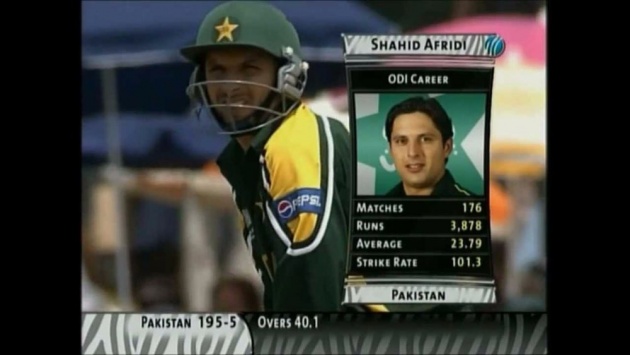
Contents
[hide]
1Background
2International career2.1Captaincy (2009–2011)
2.2Conditional retirement and return (2011–present)
3Playing style3.1Batting
3.2Bowling
4Charity work
5Five-wicket hauls5.1One Day International five-wicket hauls
6Filmography
7Awards
8International Centuries8.1Test centuries
8.2One Day International Centuries
9International awards9.1One-Day International Cricket9.1.1Man of the series awards
9.1.2Man of the Match awards
9.2Twenty20 International Cricket9.2.1Player of the Series Awards
9.3Twenty20 International Cricket9.3.1Man of the Match Awards
10See also
11References
12External links
Background
Afridi was born on 1 March 1980 in Khyber Agency of the Federally Administered Tribal Areas, Pakistan. He is from the Afridi tribe of Pashtuns. He is cousin of Javed Afridi, CEO of Haier Pakistan.[4][13] Afridi is married to Nadia and has four daughters.[15]
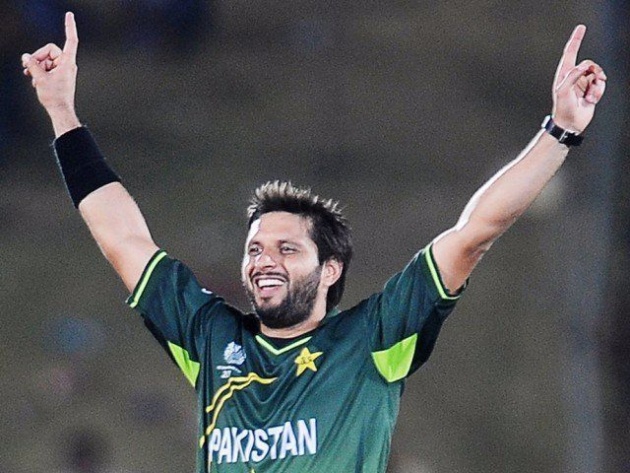
International career
In October 1996 at the age of sixteen Afridi was drafted into the ODI team during the four-nation Sameer Cup 1996–97 as aleg spinner as a replacement for the injured Mushtaq Ahmed.[16] He made his debut on 2 October against Kenya, however he didn't bat and went wicketless.[17] In the next match against Sri Lanka, Afridi batted at number three in the role of a pinch-hitter. In his first international innings, Afridi broke the record for fastest century in ODI cricket, reaching his hundred from 37 balls. The eleven sixes he struck also equaled the record for most in an ODI innings.[18][nb 1] Aged 16 years and 217 days, Afridi became the youngest player to score an ODI century.[20] Pakistan posted a total of 371, at the time the second-highest in ODIs, and won by 82 runs; Afridi was named man of the match.[18] The record for fastest century in ODI was broken by New Zealand cricketer Corey Anderson on 1 January 2014 who hit 131* runs from 36 balls and is now held by South-African cricketer AB de Villiers who made a century from 31 balls on 18 January 2015 against West Indies.[21]
Afridi with his team mates during the2009 World Twenty20 in June 2009
Two years after appearing on the international scene, Afridi made his Test debut in the third game of a three-match series against Australia on 22 October 1998.[22] By this point he had already played 66 ODIs, at the time a record before playing Tests.[23] He opened the batting, making scores of 10 and 6, and took five wickets in the first innings.[22] He played his second Test the following January during Pakistan's tour of India; it was the first Test between the two countries since 1990.[24] Again opening the batting, Afridi scored his maiden Test century, scoring 141 runs from 191 balls. In the same match he also claimed three wickets for 54 runs.[25] After winning the first match by 12 runs, Pakistan lost the second to draw the series.[26]
Shahid Afridi emerged to international scene with a big 'boom' as he scored the fastest ODI century (off 37 balls) in his first international innings (second ODI match) against Sri Lanka in 1996. Afridi is fondly called as 'Boom boom Afridi' for his aggressive batting style. Along with his aggressive batting, he has established himself as one of the most effective leg-spinner in one-day cricket. He has so far amassed more than 6,500 runs and captured 300 plus wickets in one-day internationals. Afridi is the current Twenty20 captain for Pakistan and was leading the one-day side till May 2011. As skipper, Afridi led Pakistan to the semifinal of the 2011 Cricket World Cup before losing to eventual champions India in Mohali. Afridi made his ODI debut against Kenya at Nairobi in October 1996, and was awarded Test cap against Australia two years later at Karachi in October 1998. The dashing all-rounder has hit most sixes in the history of ODI cricket but still consider himself as better bowler than batsman.
An innings-by-innings breakdown of Afridi's Test match batting career up to 30 December 2007, showing runs scored (red bars) and the average of the last ten innings (blue line)
Afridi made his presence felt in the third Test against India in March 2005, scoring a quick-fire second-innings half-century and taking five wickets in the match (including Tendulkar twice) to help Pakistan to win the game and register a series draw.[34] In April Afridi struck what at the time was the equal second-fastest century in ODIs; he reached 100 off 45 deliveries against India, sharing the record with West Indian Brian Lara.[35] Afridi was more consistent with his batting and bowling throughout 2005, starting with the tours of India and West Indies and through to the England tour. The Pakistani coach Bob Woolmer helped Afridi to reach a fuller potential by improving his shot selection and giving him free rein over his batting attitude.
On 21 November 2005, Shahid Afridi was banned for a Test match and two ODIs for deliberately damaging the pitch in the second match of the three-Test series against England. Television cameras pictured him scraping his boots on the pitchscuffing the surface when play was held up after a gas canister exploded. Afridi later pleaded guilty to a level three breach of the ICC code of conduct relating to the spirit of the game. Match referee Roshan Mahanama said: "This ban should serve as a message to players that this type of behaviour is not allowed."[36][37][38]
On 12 April 2006, Afridi announced a temporary retirement from Test cricket so that he could concentrate on ODIs, with a particular focus on the 2007 World Cup, and to spend more time with his family. He said he would consider reversing his decision after the World Cup. Afridi had played ten Tests since being recalled to the side in January 2005, averaging 47.44 with the bat including four centuries.[39] However, on 27 April he reversed his decision, saying that "[Woolmer] told me that I am one of the main players in the team and squad and that Pakistan really needed me".[40] Before Pakistan toured England in July to September, Afridi played for Ireland as an overseas player in the C&G Trophy.[40] In six matches, he scored 128 runs[41] and took seven wickets.[42] England won the four-match Test series 3–0;[43] Afridi played two matches, scoring 49 runs[44] and took three wickets.[45] It was the last Test cricket Afridi played until 2010.[46]
Afridi was charged on 8 February 2007 of bringing the game into disrepute after he was seen on camera thrusting his bat at a spectator who swore at him on his way up the steps after being dismissed. Afridi was given a four-game ODI suspension, the minimum possible ban for such an offence, meaning that he would miss Pakistan's first two 2007 World Cup matches. The PCB and Afridi chose not to appeal the ban, despite feeling that the punishment was excessively harsh.[47]
In the 2007 World Twenty20, he performed poorly with the bat but brilliantly with the ball, earning the Man of the Series award, though he failed to take a wicket in the final and was out for a golden duck.But in the next ICC Twenty20 World Cup, held in 2009 Afridi performed brilliantly in the series scoring 50 runs in the semi-final and 54 in the final and leading his team to victory
.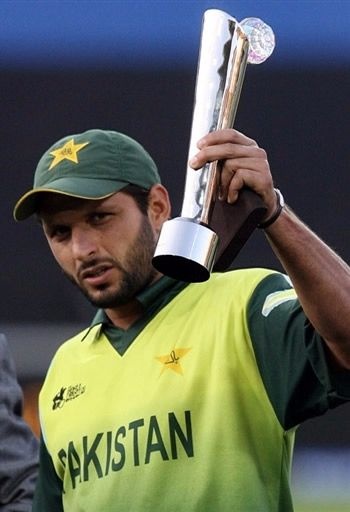
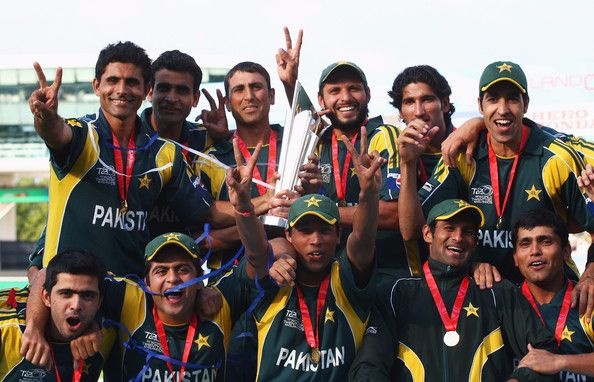
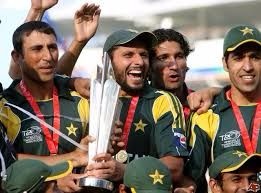
Captaincy (2009–2011)
Shortly after Pakistan won the 2009 ICC World Twenty20 the captain Younis Khan announced his retirement from Twenty20 cricket the Pakistan Cricket Board (PCB) subsequently announced that Shahid Afridi had taken over as captain in T20Is; the appointment was initially for one match, with a decision on the permanent replacement to be made later.[48] On 31 January 2010, Afridi was caught on camera biting into the ball towards the end of the 5th Commonwealth Bank ODI series in Australia.[49] Later Afridi pleaded guilty to ball tampering and he was banned from two Twenty20 internationals.[50]
In March 2010 the board announced that Shahid Afridi had been appointed ODI captain in place of the sacked Mohammad Yousuf he led Pakistan in the 2010 Asia Cup and during his first three matches as ODI captain he scored two centuries against Sri Lanka and Bangladesh he finished as the tournaments highest runscorer with 384 runs from 3 matches.
On 25 May 2010, Afridi was appointed captain of the national team in all three formats, after he announced his return to Test cricket.[51] In July 2010, Afridi captained Pakistan in the first Test of the series at Lord's against Australia. He scored 31 off 15 deliveries in the first innings and 2 in the second but was dismissed succumbing to rash strokes in both the innings. After the match, he announced retirement from Test cricket again citing lack of temperament for Test cricket as the reason.[52] Afridi was officially removed from the Test squad on the England tour, but after the spot-fixing scandal saw Mohammad Asif, Mohammad Amir and Test captain Salman Butt temporarily suspended by theInternational Cricket Council, he stated that he might return to Test cricket if "the team needs it".[53] According a representative of Afridi, he had voiced his concerns about Mazhar Majeed – who had approached Pakistan's players – in June.[54] Majeed also confirmed that he approached Afridi, Abdul Razzaq, Younis Khan and Saeed Ajmal but all off them refused to be affiliated with him of his fixing menace. Worth mentioning is that the four names given above were not associated in the original scandal and that no disciplinary action have been taken against them by the sports governing body the International Cricket Council.[55]
Afridi's results in international matches[56]
Matches
Won
Lost
Drawn
Tied
No result
Test[57]
27
9
9
9
0
–
ODI[58]
398
218
170
–
1
9
T20I[59]
80
48
31
–
1
–
In October, Afridi stated in an interview with Express News that the squad had been selected without his consultation; the PCB gave him an official warning for the interview.[60] Coach Waqar Younis also expressed his unhappiness at having no input in selection, however Mohsin Khan, the chief selector, defended the decision, stating "it is not written down in the PCB constitution that the coach and captain(s) must have a say in the selection of any squad".[61] Pakistan lost the series 3–2.
Afridi in the field during a 50-over warm-up match against Somerset at the County Ground, Taunton, during Pakistan's 2010 tour of England.
The team toured New Zealand between December 2010 and February 2011 for two Tests, six ODIs, and three T20Is. Pakistan lost the first two T20Is but won the third; in final match Afridi became the first cricketer to reach 50 international wickets in the format.[62] In the same match, he also became the first cricketer to have completed the double of 500 runs and 50 wickets in the T20 Internationals.[63] When Pakistan's squad for the 2011 World Cup was announced no captain was named; Afridi, the incumbent ODI captain and Misbah-ul-Haq, the Test captain, were the front runners for the position.[64] Pakistan lost the first match against New Zealand by 8-wickets, the second match got rained out and in the third Mohammad Hafeez scored a century and Afridi scored a blistering 65 from just 25 balls. The following match was a tight game but Pakistan prevailed by two-wickets thanks to three boundaries from Sohail Tanvir, the match was set up by a 93 not out from Misbah-ul-Haq. The fifth ODI was won for Pakistan by 43 runs courtesy of a maiden ODI-century from Ahmed Shehzad. Afridi helped in the lower order by scoring 24 and taking two crucial top order wickets to help guide Pakistan to a 43-run victory and their first ODI series win in two years.[65]
After gaining victory as a captain against New Zealand, the PCB declared Shahid Afridi as Pakistan's captain for the 2011 World Cup. In Pakistan's opening match of the tournament, Afridi took 5 wickets for 16 runs against Kenya, giving him the best bowling figures by a Pakistan bowler in a World Cup.[66] In the following match against Sri Lanka, which Pakistan won, Afridi claimed for more wickets to help his side to victory and became the second player to have scored 4,000 runs and taken 300 wickets in ODIs.[67][nb 2] He claimed 17 wickets from 6 matches in the first round of the Cup, including a five-wicket haul against Canada,[68] as Pakistan finished top of their group and progressed to the next stage.[69] After beating the West Indies in the quarter-final, with Afridi taking four wickets,[70] Pakistan were knocked out of the semi-finals in a 29-run defeat to India.[71] Afridi was the tournament's joint-leading wicket-taker with 21 wickets, level with India's Zaheer Khan, even though Afridi had played one match less than him.[72]
Soon after the World Cup Pakistan toured the West Indies for a T20I, five ODIs, and two Tests. Pakistan lost the only T20I[73] but won the ODI series that followed 3–2.[74] Afridi took two wickets and scored 28 runs in the series.[75][76] The coach, Waqar Younis, fell out with Afridi and in his report on the tour criticised Afridi, saying "as a captain he is very immature, has poor discipline, lacks a gameplan and is unwilling to listen to others' opinions or advice".[77] After the series, on 19 May the PCB replaced Afridi as ODI captain with Misbah-ul-Haq for the two-match ODI series against Ireland later that month. In 34 ODIs as captain, Afridi led his side to 18 wins and 15 defeats.[78] Afridi subsequently withdrew from the touring squad, citing the illness of his father.[79]
Conditional retirement and return (2011–present)
On 30 May Afridi announced his conditional retirement from international cricket in protest against his treatment by the PCB. The condition on his return was that the board be replaced.[80] The PCB suspended Afridi's central contract, fined him 4.5 million rupees ($52,300), and revoked his no-objection certificate (NOC) which allowed Afridi to play for Hampshire. Afridi filed a petition with the Sindh High Court to overturn the sanctions. On 15 June, Afridi withdrew his petition after an out of court settlement and the PCB reinstated his NOC.[81] When the PCB's central contracts were renewed in August, Afridi's was allowed to lapse.[82] In October he withdrew his retirement as Ijaz Butt had been replaced as chairman of the PCB. [83] Two weeks after his announcement, Afridi was included in Pakistan's squad to face Sri Lanka in three ODIs and a T20I.[84] In November 2011, Afridi became the only cricketer to score a half-century and take five wickets on two separate occasions in ODIs.[85] Afridi achieved this feat in the fourth ODI against Sri Lanka which helped Pakistan to secure the one-day series.[86] He also became the first person to score 50 in his 50th T20 International (he is the only one to have played 50 T20Is as of 9 July 2012). Afridi holds the most Player of the Match awards with 7, one above Sanath Jayasuriya and Kevin Pietersen who are both tied in 2nd place with 6.[63]
In 2013 during the first ODI game against the West Indies in Guyana, Afridi finished with figures of 7/12, the second best ODI bowling figures of all time.[87][88]
In July 2014, he played for the Rest of the World side in the Bicentenary Celebration match at Lord's.[89]
Afridi announced his retirement from ODI cricket after 2015 Cricket World Cup. Pakistan lost to Australia in the quarter final and lost the tournament.
Playing style
Afridi bowling his stock leg-spindelivery
Batting
His general style of batting is very aggressive and attack oriented and has earned him the nickname "Boom Boom Afridi". Moreover, out of the seven fastest ODI centuries of all time, Afridi has produced three of them.[90] As of May 2013, he has an ODI strike rate of 114.53 runs per 100 balls, the third highest in the game's history.[91] This attitude has been transferred to Test cricket as well, with Afridi scoring at a relatively high strike rate of 86.97.
He hits many sixes long and high, favouring straight down the ground or over midwicket. His trademark shot is a cross-batted flick to theleg-side to a ball outside off stump. However, his aggressive style increases his risk of getting out and he is one of the most inconsistent batsmen in cricket. This is reflected by the fact that he is the only player to score more than 7,000 ODI runs at an average under 25.[92]Afridi is the only player in the world who has scored 1,000 runs and 50 wickets in the T20 format of the game.[93] Afridi has moved about the batting order, and this lack of consistency has made it difficult for him to settle. In the Indian subcontinent, where the ball quickly loses its shine, he prefers to open the batting however elsewhere he prefers to bat at number six.[94]
Bowling
Having started as a fast bowler, Afridi decided to start bowling spin after he was told he was throwing. He modelled himself on Pakistan leg-spinner Abdul Qadir.[4] Afridi began his career as primarily a bowler, however after scoring the fastest century in his maiden ODI innings more was expected of him with the bat. He considers himself a better bowler than batsman.[94] While he is renowned for his aggressive batting, he is also a handy leg-spinner capable of producing a good mix of wicket taking balls.[95] He has over 350 International wickets, most of which are from the ODI format. While his stock ball is the leg break, his armoury also includes the conventional off break and a "quicker one" which he can deliver in the style of a medium-pacer, reaching speeds of around 130 km/h (81 mph).[96] He bowls at a high speed for a spinner, resulting in lesser turn, and relying more on variations in speed. He occasionally sends down a bouncer to a batsman, which is very rare for a spin bowler.
Charity work
See also: Shahid Afridi Foundation
In March 2014, Shahid Afridi established his foundation "Shahid Afridi Foundation" which aims to provide healthcare and education facilities in Pakistan. He was also named among world's most charitable athletes by Do Something in August 2015.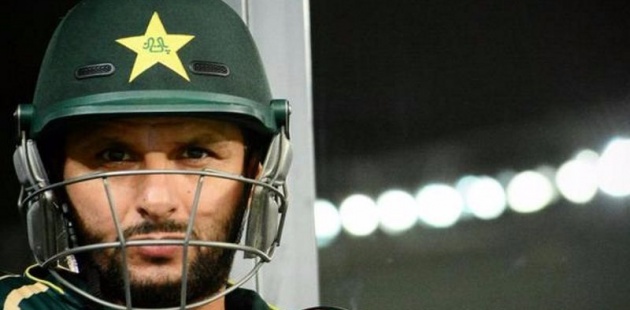
Read More
Batting and Fielding Averages
Mat Inns NO Runs HS Ave BF SR 100 50 4s 6s Ct St
Tests 27 48 1 1716 156 36.51 1973 86.97 5 8 220 52 10 0
ODIs 381 353 26 7652 124 23.40 6614 115.69 6 36 688 333 119 0
T20Is 74 69 11 1112 54* 19.17 772 144.04 0 4 89 46 20 0
First-class 111 183 4 5631 164 31.45 12 30 75 0
List A 482 449 30 10457 124 24.95 8 55 144 0
Twenty20 150 134 16 2320 80 19.66 1507 153.94 0 7 191 110 39 0
Bowling Averages
Mat Inns Balls Runs Wkts BBI BBM Ave Econ SR 4w 5w 10
Tests 27 47 3194 1709 48 5/52 5/43 35.60 3.21 66.5 1 1 0
ODIs 381 355 16732 12929 378 7/12 7/12 34.20 4.63 44.2 4 9 0
T20Is 74 73 1610 1741 77 4/11 4/11 22.61 6.48 20.9 3 0 0
First-class 111 13493 7023 258 6/101 27.22 3.12 52.2 8 0
List A 482 21319 16464 492 7/12 7/12 33.46 4.63 43.3 5 11 0
Twenty20 150 149 3253 3554 173 5/20 5/20 20.54 6.55 18.8 4 1 0



